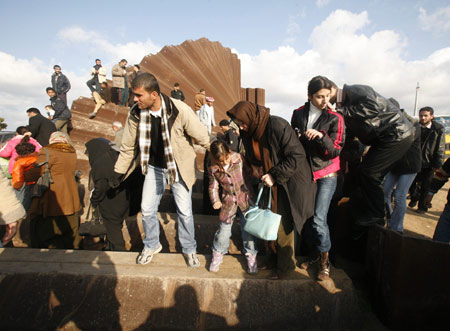He climbed on board a pick-up truck, one of a dozen passengers wedged into the back, each paying 20 Egyptian pounds (£2) for what would have been a brief 20-minute drive along the main road. But to avoid the now frequent police checkpoints the truck took a tortuous journey along Bedouin tracks through the desert for two and a half hours. Twice the truck became wedged in the sand until Shuber, 30, and his fellow passengers got out to push.Once in El Arish he found, to his dismay, that the police had closed all the shops and restaurants in an effort to send the hordes of Palestinian shoppers home.
"I don't know where I'm going. I just came to have a look," said Shuber. "I was hoping to buy some electronics, maybe a food mixer for the kitchen or something for the children. But the prices have gone up and most of the shops are shut."
. . .
Some had put up with long and difficult journeys. Sara el-Masri and her son, Ahmad, 12, had been made to walk through the desert for three hours on Saturday to bypass the checkpoints. She returned only with a handful of gifts from a friend she had visited. "I wanted to come for the adventure. In Gaza we have nowhere to go," she said. "I just wanted to see something different."
Monday, 28 January 2008
Shopping in Egypt
Subscribe to:
Post Comments (Atom)


2 comments:
Sorry Linda, but the headline and classification of this story about Palestinians bursting out of the Gaza ghetto as a "shopping story" are trivialising, heartless and in poor taste. It's not awfully jokey for the Palestinian mother needing nappies for her baby etc etc and a people deprived of the basic necessities of life, and suffering desperation, a climate in which extremism has more chance of taking root. You have a thoughtful piece in the Guardian today (29 Jan) about wanting to "buy ethical" when it comes to clothes, and are known as someone who wants ME peace. Couldn't you and like-minded others combine both interests and help promote a textile industry in Palestine? After all, I seem to remember there was a thriving lingerie project in the West Bank until the Israelis made exports impossible. There is a lot of craftsmanship among Palestinians,with traditional and modern skills, and interest in fashion. It could help reduce local unemployment, and enhance the chances of peace.
This is not a political blog. It's a blog about fashion and literature. I ran this extract, without comment, because I felt it required none, about the desperate need of Palestinians to exercise the right to do the most normal thing in the world, go shopping for daily necessities and even for things that are not even necessities, like a food mixer or presents. And the considerable obstacles they are faced in doing so.
Post a Comment